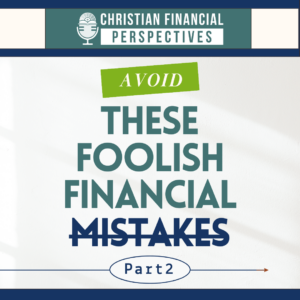Click below to listen to Episode 196 – Avoid These Foolish Financial Mistakes Part 2
Subscribe: Apple Podcasts | Google Podcasts | Spotify | Amazon Music | Stitcher | RSS | More
Avoid These Foolish Financial Mistakes Part 2
Want to avoid money regrets and costly financial errors? Eager to learn common pitfalls that trip up even seasoned investors? Well, in this episode of our 2 part series on “Foolish Financial Mistakes”, Bob and Shawn cover 10 more financial mistakes to steer clear of that can cost you dearly.
Instead of blaming others for financial mistakes, they emphasize using wisdom and taking responsibility for one’s financial decisions. It’s important to seek out professional financial advice from a fiduciary based advisor who has your best interests in mind. As always, please share this content with anyone who you think may benefit from it!
HOSTED BY: Bob Barber, CWS®, CKA®
CO-HOST: Shawn Peters
Mentioned In This Episode
Bible Verses In This Episode
PROVERBS 28:26
Those who trust in themselves are fools, but those who walk in wisdom are kept safe.
JAMES 1:5
If any of you lacks wisdom, you should ask God, who gives generously to all without finding fault, and it will be given to you.
JEREMIAH 29:11
For I know the plans I have for you,” declares the Lord, “plans to prosper you and not to harm you, plans to give you hope and a future.
Want to ask a question about your specific situation? Schedule a complimentary 15 minute phone call.
EPISODE TRANSCRIPT
Shawn:
Want to avoid money regrets and costly financial errors? Eager to learn common pitfalls that trip up even seasoned investors? Well today, we’ll be covering part two of our discussion on foolish financial mistakes to steer clear of that can cost you dearly. Let’s get some perspective.
Welcome to another episode of Christian Financial Perspectives. My name’s Shawn Peters. I’m joined as always by my father-in-Law, Bob Barber. And today we’re going to be going into part two of our “Foolish Financial Mistakes To Avoid”. We covered a few scriptures on the last episode. If you haven’t already taken a look at that, I would definitely recommend you stop now, click the link in the description, go back and watch that. But we’re going to start with the scriptures and then we’ll kind of get into this next section. So Proverbs 28:26, “Those who trust in themselves are fools, but those who walk in wisdom are kept safe.”
Bob:
Amen. James 1:5, “If any of you lacks wisdom, you should ask God who gives generously to all without finding fault and it will be given to you.”
Shawn:
And Jeremiah 29:11, “‘For I know the plans I have for you,’ declares the Lord. ‘Plans to prosper you and not to harm you. Plans to give you a hope and a future.'” As we alluded to a little earlier last week, we did cover part one of this foolish financial mistakes series, if you will, that these mistakes, they could cost you thousands if not hundreds of thousands of dollars. If you didn’t see it, again, pause now, click the link in description, go check that out. Today in part two, we’re going to be continuing that. Bob put this together from, what is it, over 30 years at this point?
Bob:
Yeah, that’s right.
Shawn:
Of experience.
Bob:
I’ve seen ’em over and over. Just same mistakes over and over and over. And that was really interesting when I put this together, how, gosh, it only took me about 15, 20 minutes and then I worked on it from there. But these were coming into my mind as fast as I could write ’em down, bottom line.
Shawn:
And there’s a lot of crossover. So obviously part of that too was kind of bringing that down to a total of 20, so we didn’t have too much.
Bob:
It was actually more than 20. And that’s why we did this in a two-part series because there’s so much to take in. So this is not to hurt anyone, this is to help you. This is to say don’t do these. And all of us have been guilty of these mistakes and that’s the way you learn, probably gives you gray hair. That’s why I got a lot of it.
Shawn:
So hopefully these don’t insult you in any way, but they are helpful and beneficial. That’s why we like that Jeremiah scripture. So without further ado, let’s get onto number 11 of the 20 that we’ll be discussing today. Which number 11? Blaming someone else for your financial mistakes pointing at someone.
Bob:
Shawn, if I point at you.
Shawn:
Oh yeah.
Bob:
Okay. If I point at you, I got one finger point at you, how many I got pointing back at me?
Shawn:
That’s right. You got three.
Bob:
I got three pointing back at me. And I’ve seen this, I’ve seen people blame like an older generation. You’re the reason I’m making all these financial mistakes. You’re the problem behind my financial problems. And you can’t do that. You’ve got to own up to it and you’ve got to take responsibility. And we have such good tools today like Financial Peace University by day, wonderful program. We’ve got Crown Ministries that you can go to. There’s a lot of good information out there to teach yourself, including our program. If you listen to this every single week, we’re giving you an education about not making foolish mistakes that financially cost you.
Shawn:
And we do that because, with our mission and vision as a company, one of those things is that we want to expand God’s kingdom through the influential gate of finance. And so we feel that doing programs like this, even when we’re talking about something that maybe is a little harder to hear, we want to make sure that we’re honoring the Lord and we are trying to help people with sound Biblical and financial advice. So Financial Peace University is great. Crown has a lot of great resources available, including they actually have one-on-one mentoring. That is really useful if you’re someone who’s in debt or maybe you just got out of it, but you’re trying to get some basics together, they have a really good program for that that they do as a nonprofit.
Bob:
They really do. Yeah.
Shawn:
Alright, well number 12, investing all your money in one asset class, like say only residential real estate or…
Bob:
Tech.
Shawn:
Tech, energy stocks, or even just cash.
Bob:
You like what I have – in cash.
Shawn:
We grow safely because of inflation and loss of purchasing power.
Bob:
I have seen, “I’m not going to invest in anything. It’s just going to be all in cash.” Well, you’re investing in cash. In cash, right?
Shawn:
And then you lose money because of inflation.
Bob:
Number 13 is allowing others like the internet, email, TV ads to manipulate you into making long-term bad financial decisions like buying gold.
Shawn:
Yeah, that’s the most common.
Bob:
And I know just recently we had a program on that. Because they’re out there and they want to manipulate you and they want to manipulate you because they’re making some very high commissions.
Shawn:
That’s right.
Bob:
On selling you a certain product.
Shawn:
There are better and worse, obviously, places and companies you can buy precious metals through, but from what I’d seen of the averages, it’s anywhere from what, 3% to 10% for a decent company. So whatever you’re buying, you’re paying that commission either on top of or as part of your total, what you actually get back. Some of the companies are at 30% and 50% just very predatory.
Bob:
When you told me that and you were doing that research, I was like, you got to be kidding me.
Shawn:
And then here’s the catch. Even if it is one of the better companies where it’s the 3% to 10% range, what that also means then is when you want to sell it back, you’re going to be paying a transaction cost again. So whatever that percentage is when you initially buy it and when you sell it, obviously that goes back into it. And so, if you just look at precious metals and see what was the price at this time to this time, you got to make sure you take into account all those additional transaction costs.
Bob:
Yeah, correct. And taxes by the way.
Shawn:
Yeah, exactly. Yeah. So overall, long story short, we talked about before, but for precious metals, it’s not that you can’t ever make money on it, but it’s typically a shorter term possible option because in the longer term it doesn’t do very well compared to an actual diversified portfolio.
Bob:
So number 14, number 14 is procrastination. Boy, this is a mistake I see a lot of people make. They’re trying to wait for that convenient time to come to start saving, start putting money aside, pay off that debt. Lemme tell you, it’s never going to come. The convenient time, it’s never going to come and you just have to start doing it now. So don’t think by waiting you’re getting any farther along.
Shawn:
The best time to start that saving and investing plan is today.
Bob:
And it might start with just saying, I’m not going to drink that $6 cup of coffee every day and I’m going to start saving that extra $6. I’m going to drink it at home and over a month you’re going to now save at least $100, maybe $120 if you did it all 30 days. And then you start putting that aside.
Shawn:
Alright, number 15, spontaneous emotional spending without thinking about the long-term consequences.
Bob:
Boy Shawn, with the apps today.
Shawn:
Oh my goodness. Yeah,
Bob:
On our smartphones, you enter in your credit card information once and there it is and you can just pop, pop, pop, pop. And it’s just so easy now to buy. I see in my neighborhood, I think Amazon and UPS just kind of, they just hang out in their neighborhood and they probably hang out in your neighborhood, too. You probably see ’em every day. You hear those trucks.
Shawn:
Those kinds of services. Bob, they’re such a great example of how a ingenuity and technological advancement and improvements in processes, how they can be such a great thing. But if you’re not careful, they can also have that other edge of the sword and be a really negative with people who don’t practice diligent spending and purchases that because it’s so easy, you can very quickly overspend.
Bob:
Small purchases can add up very quickly.
Shawn:
Right. Alright. Which goes into number 16 then.
Bob:
Number 16, it does go right into it. You know how I feel about this? Using a credit card for everyday purchases instead of a debit card. I am a big believer, I do not believe in using the credit card, even if you say I’m paying it off every day. Credit card companies, they’re not going to stop you and they’re not motivated to keep you inside a budget. Okay. They’re actually motivated the other way to enslave you so that you owe money to them and they can charge you. I mean the interest rates today are like 20% plus.
Shawn:
Or more depending on…
Bob:
It’s just absolutely insane. I was just talking with a Christian brother yesterday and he was talking about, he says, yeah, we pay it off every month. He goes, but then there’s always these extra little things that I see in there and I’m like, where’d this come from? Where’d this come from? If you use a debit card, there’s no way you can overspend. I’m coming up with a program.
Shawn:
And if you do, you’ll get penalized.
Bob:
And I’m just going to give you a little for the future so you’ll know it’s called “Budgeting Simplified”, and I’m going to explain to you how you get paid into one account and then you have a second account that you use for your expenses and you only put a certain amount over there each week. For those of you that don’t like budgeting with today, with your bank app, you can go online and you can see this is what I have in the balance.
Shawn:
Automatically, you only spend what you actually allocated.
Bob:
That’s right. Yeah, exactly. You just cannot go over where a credit card, they’re not going to call you and say, “Hey, by the way, you went over.”
Shawn:
Oh, it’s the opposite. Jenna and I have had a card for a long time and we get contacted somewhat regularly letting us know, “By the way, did you know that we could increase your credit limit?”
Bob:
Oh yeah. Right.
Shawn:
We don’t need to.
Bob:
Don’t ever.
Shawn:
We don’t come close to using it now.
Bob:
We don’t want to increase it.
Shawn:
That’s just asking for trouble.
Bob:
Alright. Okay. Boy, this is an advertisement I see every single day on tv. I just do not like it. Okay, at all.
Shawn:
Number 17, buying insurance based only on price, not adequate coverage.
Bob:
“Only buy what you need.” That is the most ignorant quote in advertising I have heard – “Only buy what you need.” When you get in an accident, are you going to be happy that you bought as little as possible because that’s what they mean. And I’ve never met anybody that’s been in an accident that bought through one of these companies the minimal amount of coverage, and I mean you can get the minimum can get way down, way down there.
Shawn:
Really what it comes down to is when insurance is being promoted as “by the minimum” or by only “what you absolutely need”, The issue with that is you, it’s kind of forgetting the primary purpose of insurance in the first place, which is risk mitigation. You’re trying to cover a risk that you may not be able to cover out of pocket with cash or otherwise. So you’ve got to look at not just what is the cheapest, but like we said, adequate, you need to make sure that you’ve adequately covered the risk that that situation is causing depending on what kind of insurance it is and buy accordingly.
Bob:
We know Ron First of Christian Insurance Services and he has had people come to him that didn’t buy from him in the first place. And this is not an advertisement for him, but he’s told me some of the stories of people that have bought strictly based on price and not coverage, and it’s heartbreaking. It’s very heartbreaking. It is one of the most foolish financial mistakes you can make.
Shawn:
As a personal, positive story though was that Ron had helped Jenna and I with our auto insurance when she had gotten rear-ended by somebody. totaled the car, but also caused further damage with her back and everything. And one of the things that was just a slight increase in price maybe compared to some other options, but Ron had helped us with the PIP, the personal injury protection. And so it provided so much more money that without even technically waiting for the claim to be filed, we could basically get help with anything related to medical and other types of expenses. And so just those little things like that.
Bob:
It doesn’t cost that much more.
Shawn:
No, it doesn’t. Yeah. So number 18, not having an estate plan with a will or trust, medical and financial power of attorney. Yeah.
Bob:
I have seen families destroyed by this. I just got a call last week, Shawn. It was heartbreaking. It was actually from a mom that’s an older mom and the son’s wife passed away, and there was no will at all and all the bills were being paid out of her account, all of them. So guess what’s happening? There’s no money to pay the bills that needed to be paid because everything was going into her account. Now, he’s got to go through probate.
Shawn:
Before they can get access to anything.
Bob:
Isn’t that crazy? Yeah. I’ve watched this probate sometimes go on for eight or nine months. I’ve seen families fight over inheritances. It’s just foolishness to not to update your estate plan. I say update. Hopefully, you have one and if you do have one, you probably need to update it, too. They need to be updated every two or three years.
Shawn:
Yeah, that’s right. Number 19, not monitoring your bank account balances and spending frequently. No one else is looking at this for you.
Bob:
You got to look at it. You hear, well, I don’t want to have the app because I’m scared of somebody’s going to hack me. If you monitor your bank account every day, you’ll know if somebody’s hacked you. This is where when we get to the program where we’re going to talk about budgeting simplified. This can help so much and all the banks have apps today.
Shawn:
And number 20, the number one mistake by far, not having a financial plan or blueprint and updating it at least once a year, especially before you make a large withdrawal. It’s a little bit of a long one, but by far the most important one.
Bob:
And I say this and you’ve probably heard the statement, I don’t know, maybe you’ve not heard the statement. This is a statement that it’s been around a long time. “No one plans to fail. They just failed a plan.” And kind of goes into the second biggest financial mistake that we shared last week is that we see people all the time selling appreciated assets to buy depreciating ones like a car. And that is a very foolish mistake because you think about you take $50,000 out for a car now, it’s not going to grow and it’s not going to compound to a 100k and it’s not going to compound the 200k, and I’ve said this so many times.
Shawn:
The longer you have, if you just went into retirement, chances are you’ve got 30 years, 20, 30 years. So the longer you have the more costly taking money out of appreciated assets to buy depreciated one like a car impacts you.
Bob:
Well, there you go. There’s 20 of them. Again, if you didn’t hear last week, we’d emphasize you go back and listen to those first 10. We are here to help you with your financial life. With Christian financial advice. It’s fiduciary based advice as well. We do not make any commissions here. We don’t sell commission based products. We’re paid by you, no one else.
Shawn:
That’s right. So give us a call, (830) 609-6986. Visit our website at www.christianfinancialadvisors.com. You can also comment in the video if you’re watching the video.
Bob:
Oh yeah, we wanted to mention this.
Shawn:
If you know someone that might benefit from this content, either this video or any other video that you watch or whatever it might be, feel free to share it with them. This is for anybody that wants to watch. It’s why we put it out there publicly. So if anyone might benefit from this that you know, share it with them. Thank you. And that’s all. God bless.
[DISCLOSURES]
* Investment advisory services offered through Christian Investment Advisors Inc dba Christian Financial Advisors, a registered investment advisor registered with the SEC. Registration as an investment advisor does not imply a certain level of skill or training. Comments from today’s show are for informational purposes only and not to be considered investment advice or recommendations to buy or sell any company that may have been mentioned or discussed. The opinions expressed are solely those of the hosts, Bob Barber and Shawn Peters, and their guests. Bob and Shawn do not provide tax advice and encourage you to seek guidance from a tax professional. While Christian Financial Advisors believes the information to be accurate and reliable, we do not claim or have responsibility for its completeness, accuracy, or reliability.














